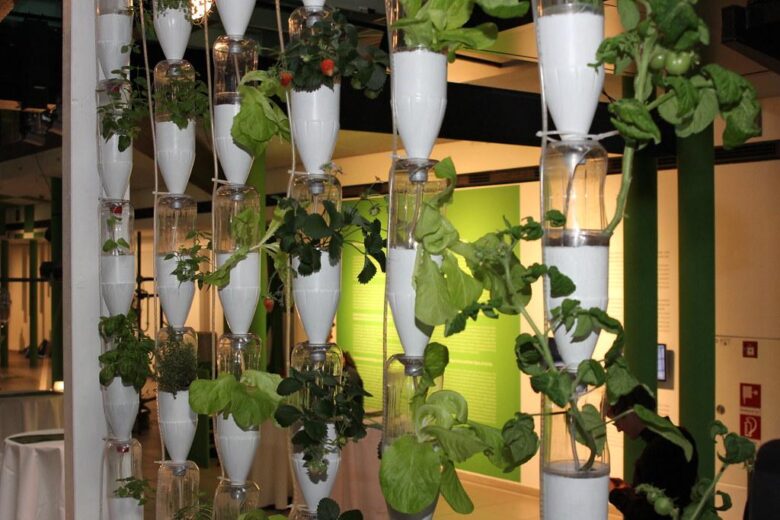Welcome to a world where greenery defies gravity and ordinary limitations! As urban spaces become increasingly confined, ingenious garden enthusiasts have turned to the heavens, coaxing lush landscapes to cascade down from above. With the rise of DIY hanging gardens, behold a realm where foliage thrives, suspended in mid-air, transforming concrete jungles into oases of natural splendor. Vertical planting has become the green thumb’s canvas, weaving imaginative solutions that combine artistry, practicality, and a touch of magic. In this article, we dive headfirst into the wondrous world of DIY hanging gardens, unearthing innovative ideas to elevate your green space to ethereal heights. So, buckle up – or rather, let’s “hang on” – for an extraordinary journey that will revolutionize how you view the realms of gardening!
Exploring the Versatility of Vertical Gardens: Transforming Small Spaces into Lush Oases
DIY Hanging Gardens: Creative Solutions for Vertical Planting
Do you dream of lush greenery and vibrant flowers but lack the space for a traditional garden? Look no further than vertical gardening! This innovative approach to gardening allows you to transform small, unused spaces into flourishing oases. One of the most versatile and visually stunning forms of vertical gardening is the hanging garden. With a bit of creativity and some basic materials, you can easily create a DIY hanging garden that will not only beautify your space but also provide numerous benefits for both you and the environment.
Why limit your gardening ambitions to the ground when you can take advantage of the vertical space around you? Hanging gardens are not only aesthetically pleasing but also offer practical advantages. By utilizing vertical planting, you can maximize your available space, making it perfect for urban dwellers or those with limited outdoor areas. These gardens can be easily hung from balconies, walls, or fences, adding a touch of green to otherwise neglected spaces.
Creating your own hanging garden is an exciting and rewarding DIY project. To get started, you’ll need some basic supplies such as hanging baskets or planters, hooks or brackets, potting soil, and, of course, your preferred plants. Consider selecting a variety of plants to create a diverse and visually interesting display. Mix different types of flowers, herbs, and even small vegetables to add both color and functionality to your hanging garden. As you plan your design, remember to take into account the specific care needs of each plant, ensuring they will thrive in their new vertical environment. Keep in mind that proper watering and drainage are essential for healthy plants; be sure to choose planters with sufficient drainage holes and establish a watering routine that suits the specific needs of your plant selection.
Unleashing Your Creativity: Innovative Ideas for DIY Hanging Gardens
Are you a plant lover but limited by space? Fear not, because hanging gardens offer a creative solution for vertical planting that can transform any small area into a lush oasis. With a little creativity and some basic materials, you can unleash your inner gardener and bring life to unused spaces in your home.
1. Repurposed Containers: Look around your house for unique containers that can be repurposed into hanging planters. Mason jars, old teapots, or even boots can add character to your garden while keeping your plants happy. Fill them with soil, choose plants that thrive in smaller environments, and hang them from sturdy hooks or a vertical frame.
2. Vertical Pallet Garden: Give your garden a rustic touch with a vertical pallet garden. Simply stack pallets, secure them together, and place potted plants in the gaps. This not only maximizes your space but also creates a visually appealing focal point. Use brightly colored flowers or cascading vines for an eye-catching display.
3. Macramé Plant Hangers: Add a touch of bohemian charm to your hanging garden with macramé plant hangers. This ancient art of knotting ropes can create stylish and sturdy plant holders. Experiment with different knot designs and lengths to achieve the desired look. Pair them with trailing plants for an elegant and whimsical display.
Choosing the Perfect Plants: A Comprehensive Guide for Vertical Planting
Choosing the Perfect Plants
Vertical planting, also known as vertical gardening, has gained popularity in recent years, providing a perfect solution for those living in small spaces or wanting to add a touch of greenery to their walls. When it comes to creating your own DIY hanging garden, choosing the right plants is essential for successful vertical planting. In this comprehensive guide, we will explore some creative solutions and offer tips on selecting the perfect plants to bring life to your vertical garden.
1. Assess Your Space: Before diving into the world of vertical planting, take a look at your available space. Consider factors such as sunlight exposure, humidity, and overall climate to determine the feasibility of your vertical garden. This will help you narrow down your plant choices and ensure their survival and growth.
2. Select Plants for Vertical Growth: Not all plants are suited for vertical gardening. Look for plants that have the potential to grow vertically, such as trailing vines, climbers, and plants with flexible branches. Examples of plants that work well in vertical gardens include ivy, various types of ferns, pothos, spider plants, and philodendrons.
3. Consider Maintenance and Care: Vertical gardens, just like any other type of garden, require regular maintenance. Assess how much time and effort you are willing to invest in caring for your plants. If you have limited time, choose low-maintenance plants that are drought-tolerant and require less frequent watering and pruning. On the other hand, if you enjoy gardening and have more time to spare, opt for plants that require more attention, such as delicate flowering vines and herb plants.
Plant Suggestions:
| Plant | Light Requirements | Watering Frequency |
|---|---|---|
| Ivy | Indirect sunlight | Moist but not soaked |
| Ferns | Low to medium light | Regular watering, keep soil moist |
| Pothos | Low to bright indirect light | Allow top inch of soil to dry |
| Spider Plants | Moderate to bright light | Regular watering, let soil dry between watering |
Vertical gardening offers endless possibilities for creating a unique and vibrant space. With careful plant selection, you can transform any dull wall into a stunning hanging garden. So, unleash your creativity and start exploring the world of vertical planting!
Essential Tips and Tricks for Effective Maintenance of Hanging Gardens
Creating your own hanging garden is a fantastic way to maximize your use of space, add a touch of greenery to your surroundings, and showcase your creativity. However, maintaining these vertical plantings requires some extra care and attention. Here are some essential tips and tricks to help you keep your DIY hanging gardens thriving:
1. Choose the Right Plants
When selecting plants for your hanging gardens, it’s important to choose varieties that are well-suited for this unique growing environment. Look for plants that have a compact growth habit, are lightweight, and require minimal watering. Some great choices include petunias, ivy, begonias, and trailing succulents. Avoid plants with deep, extensive root systems that may struggle to adapt to a hanging container.
2. Provide Adequate Watering
Proper watering is crucial for the health of your hanging gardens. Check the moisture levels regularly and water the plants whenever the top inch of soil feels dry to the touch. Be careful not to overwater, as excess moisture can lead to root rot. Consider installing a drip irrigation system or using self-watering hanging baskets to ensure consistent hydration.
3. Regular Pruning and Maintenance
To keep your hanging gardens looking their best, regular pruning and maintenance are necessary. Trim back any dead or yellowing leaves, pinch off spent flowers, and control the growth to maintain the desired shape. Additionally, inspect the hanging containers for pests, such as aphids or spider mites, and take prompt action to prevent infestations from spreading.
Elevating Your Outdoor Living Space: Stylish Vertical Planting Solutions for Every Budget
DIY Hanging Gardens: Creative Solutions for Vertical Planting
Transforming your outdoor living space into a lush, green oasis has never been easier with these innovative vertical planting solutions. Whether you have a sprawling backyard or a small balcony, there’s a stylish and budget-friendly option for everyone. Say goodbye to traditional planters and embrace the beauty of vertical gardening.
1. Vertical Wall Planters: Installing wall planters is a simple yet stunning way to elevate your outdoor space. These planters can be easily mounted on any wall or fence, allowing you to create a vibrant living wall. Get creative with the arrangement by mixing and matching different plant varieties and colors. Whether you prefer leafy greens or vibrant flowers, the possibilities are endless.
2. Hanging Pots and Baskets: If you’re short on space, hanging pots and baskets are the perfect solution. Simply hang them from your balcony railing or pergola for an instant burst of greenery. Mix different hanging plants to create a cascading effect and add depth to your outdoor area. Don’t forget to choose pots and baskets that match your overall aesthetic for a cohesive look.
| Planting Solution | Benefits |
|---|---|
| Vertical Wall Planters | – Adds a unique visual element |
| Hanging Pots and Baskets | – Saves space – Creates a beautiful cascading effect |
| Living Wall Systems | – Provides insulation and noise reduction - Purifies the air |
3. Living Wall Systems: For those looking to make a bold statement, a living wall system is the ultimate choice. These systems are designed to cover entire walls, transforming them into breathtaking living artworks. Besides their visual appeal, living walls provide insulation, reduce noise, and purify the air. Choose from pre-built systems or get creative and design your own personalized masterpiece.
With these creative solutions for vertical planting, you can turn any outdoor space into a lush sanctuary. So, grab your gardening gloves, unleash your green thumb, and let your imagination run wild with these DIY hanging gardens.
And there you have it, a world of greenery at your fingertips! We hope this article has sparked your imagination and inspired you to embark on your own DIY hanging garden adventure. In a world where space is a premium, vertical planting offers endless possibilities for unleashing your inner botanist.
Whether you choose to transform an old ladder into a charming plant display or utilize a repurposed shoe organizer to create a captivating herb wall, the art of vertical gardening knows no bounds. So why not defy gravity and breathe life into those dull walls?
Remember, the key to success lies in careful planning and selecting the right plants for your specific hanging garden. Consider the available light, the moisture requirements, and whether you prefer a cascading wonderland or a structured vertical oasis. Don’t be afraid to mix and match different species, textures, and colors, allowing nature to paint its own masterpiece.
In the end, a DIY hanging garden is so much more than just a spatial solution for your flourishing green friends. It’s an opportunity to cultivate a personal sanctuary, to create an immersive experience that connects you to the beauty of nature within the confines of your own home.
So go forth and let your creativity blossom as you embark on this vertical endeavor. Whether you hang your garden in a small apartment, a spacious balcony, or a humble patio, remember that nature never fails to bring harmony and serenity into our lives. After all, when it comes to embracing the marvels of vertical planting, the sky’s the limit!



